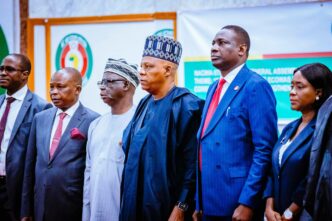BY SONNI ANYANG
Over the last two or so decades, the view seems to have taken root in Nigeria that we can somehow sing, dance, code, post, brand and speculate our way into meaningful development. This is an illusion; it is not going to happen—certainly not soon enough to make much of a difference in the conditions under which most of us live.
A country of over 200 million people who must eat, clothe themselves, shelter from the elements and carry on with life in the 21st century, has no alternative to making the tangible things that support life in this day and age. In other words, Nigeria must urgently privilege production over everything else, if it is to make sustainable progress.
It is difficult to locate the exact point in time when the focus of national energy shifted from making things to services. Since such changes rarely happen overnight, the pivot likely took place without apparent notice over many years. Looking back however, we can identify some moments in the regression.
Advertisement
One such moment was the introduction of SAP (Structural Adjustment Programme) by the Ibrahim Babangida regime in 1986. SAP ushered in trade liberalization, market-driven exchange rates, financial deregulation and privatization. The immediate aftermath was, of course, an explosion in the financial services sector. Everybody in Nigeria and his uncle went into wheeling and dealing.
We all became operators of banks, finance companies of all types and brokerage houses. The best brains and the bulk of available investment capital went into the making of money from money, turning the country into a giant financial bazaar. Thus did bankers and speculators become the toast of the Nigerian society.
The next big, identifiable moment, was the arrival of Donald Duke as governor of Cross River State. The young governor as he then was, got the entire country—from President Olusegun Obasanjo to nominally staid bankers and the general populace—charged up about the prospect of turning his state into a veritable tourist paradise. Programmes and projects like the Obudu Cattle Ranch, the Mountain Race, Tinapa Resort and of course his crowning glory, the Calabar Carnival, initiated by Duke, sold the entire nation on a vision of boundless prosperity that an endless stream of tourists would bring to Cross River State and thence to the rest of the nation.
Advertisement
Then there was the emergence of Nollywood in the 1990s which held the promise of turning the country into one huge movie production set, with millions earning their living therefrom while enjoying all that comes with the celebrity lifestyle of silver screen idols. Before we knew it, film producers, directors, script writers, production companies and actors and actresses had sprouted across the length and breadth of the country. Matters have now reached the point where it appears, young Nigerians who are not movie stars or producers, aspire to be either musicians, comedians/ MCs, skit makers, social media influencers or other sorts of yet-to-be invented performance artist. Not for them anymore the unglamorous toil on farms or the anonymous drudgery of factory work.
In this immediate connection, the success of Nigerian musicians on the world stage has served to pour petrol on a raging fire and to confirm entertainment as a sure-fire route to prosperity.
At the level of public policy, the view of entertainment and the performance arts as viable economic activities has received the tacit support and direct endorsement of governments in Nigeria. The rebasing of our GDP computation in 2013 explicitly acknowledged entertainment as an economic activity and by that simple measure, saw Nigeria propelled to the top of the GDP league in Africa. Since then, a number of government intervention measures have been announced to support movie making and related activities. NEXIM, the country’s prime export-import bank, has even established a special lending window for the creative and entertainment ‘industry’. There can be no question that Nigeria is no longer ‘playing’ with entertainment.
Another remarkable juncture in our march to the service economy was the introduction of the GSM technology in the 1990s, powered by the internet infrastructure first laid in the 1960s as a hub for interaction among scientists but mainstreamed over time into a global loop for connection among people across space and demographics. A truly breath-taking spinoff from the internet-GSM convergence is the so-called social media, which has taken the nation’s infatuation with services as the dominant mode of economic activity to an altogether dizzying level.
Advertisement
Today, many Nigerians, particularly the young but also quite a few adults, including policy makers, seem to believe that the solution to mass impoverishment in the land lies not in producing material things like yam, rice, cassava, cotton, electric bulbs, chairs or even the computers and handheld devices that are required to use the internet and social media, but in developing content, posting stuff, speculating on crypto currency, playing in foreign exchange markets or going live on certain apps and generally trying to make money for nothing (apologies, Dire Straits).
Also facilitated and enhanced by the internet and social media is so-called multi-level marketing in which mostly nostrums of dubious efficacy in the form of pills, capsules and liquid concoctions are peddled by everybody everywhere one turns. Mention must be made too, of sports betting (gambling in plain language). While sports gambling in the form of football pools, with addicts drawn mostly from the lowest rungs of the social ladder, has been around for many decades, the internet has taken sports betting mainstream. We now have in sports betting a multi-billion naira activity area in which an estimated 65 million Nigerians participate actively as patrons.
Assisted by internet penetration, betting shops are now as ubiquitous as, if not more so than, POS mobile money outlets (yet another service activity that did not exist 10 years ago but now engages hundreds of thousands, if not millions, of able bodied people in the totally ridiculous business of selling naira notes for a living). But back to sports betting. By some estimates, each day, Nigerians place 14 million bets and spend $5.5 million (or over N8 billion) in the eternal hope of cashing out big! We should therefore expect the next GDP rebasing exercise to capture both POS (mobile money) operations and sports betting and perhaps, return us to the top of the GDP league in Africa.
The foregoing narrative is, of course, highly whimsical and anecdotal. Hard data in the form of sectoral composition of GDP however supports the general trend of an expanding services sector and declining or stagnant primary and secondary (agriculture and manufacturing) sectors. In the 1960s, the contribution of agriculture to Nigeria’s GDP, for instance, stood at an average of 60%. That has now declined to about 21%. That of services, at around 54%, is trending towards replacing agriculture as the dominant sector and actually did so between 2000 and 2015 when it contributed as much as 61% to GDP on the average. Manufacturing in Nigeria has never been a big contributor either to output or employment. It currently hovers around 10/12% as a proportion of output.
Advertisement
While the pivot from production to services in Nigeria cannot be said to have been deliberately engineered, it is also the case that some people, including economists, have come to believe that the early ascendancy of services in an underdeveloped economy like Nigeria is not necessarily harmful and that services can drive sustainable growth and development.
Observing the trend of the increasing domination of the services sector against declining production sectors (agriculture and manufacturing) in total output in mature developed economies like the US 50/60 years ago, some economists started talking about, or even celebrating, the arrival of a so-called ‘post-industrial age’ (Daniel Bell: The Coming of Post Industrial Age, 1976). It was claimed that the world, or at least, the advanced parts of it, had entered a phase in which prosperity would no longer derive from the production of tangible things but from the provision of services.
Advertisement
Much later, perhaps encouraged by the expanding share of services in the GDP and exports of a few underdeveloped countries like India, some people started to push forward the view that such countries could successfully avoid the historical trajectory taken by the West which involved passing through a phase in which production, particularly manufacturing, provided the main impetus for growth and prosperity.
Such Third World countries, it has been claimed, could leapfrog to services and thence, to developed status. As the IMF (who else?), one of the key advocates of this view put it, the premature turn to services, “need not hinder economy-wide productivity growth and the prospects for developing economies to gain ground toward advanced-economy income levels” (IMF, World Economic Outlook, 2018).
Advertisement
The leapfrog advocacy runs counter to the earlier theoretical position that for countries in the global South to stand a chance at attaining high income status, they had to rapidly expand production, especially manufacturing. It also ignores the established fact that virtually every high-income economy known to history today achieved that status on the back of production, especially through manufacturing industry. (A few small countries have attained high income status as a result of special resource endowments, tourism and offshore financial services but they are the exception that proves the rule)
Notwithstanding the enthusiasm in certain quarters for the expansion of services as the prime driver of development or even the unfortunate reality that services are now so dominant in the national output mix, it is highly doubtful that developmental success awaits Nigeria at the end of that particular route. Our experience so far (and even that of India) suggests that an early turn to services is deeply dysfunctional to development. By early turn here, we mean the emergence of services as the dominant economic sector at relatively low levels of development as measured by GDP per capita.
Advertisement
Even some advanced countries, the UK being one glaring example, do not appear to be enjoying the abandonment of production they had celebrated earlier. Indeed, the general rise of protectionism against foreign manufactures in the West and the clamour for the US in particular to return to manufacturing production (which has been promoted as a hot potato political issue by Donald Trump) seem to indicate that enthusiasm for the post- industrial age is not at an all-time high.
For a poor country like Nigeria therefore to seek to skip production and to depend on services for its growth and development represents a mistake of monumental proportions. That we have inadvertently arrived at that position given the enthusiasm in Nigeria for service activities and their dominance in total output today, means that from a developmental point of view, we have seriously lost our way. Such a developmental trajectory is highly unlikely to lead us to the promised land.
The ascendancy of services in Nigeria at this point in our development suggests that we are trying to do a hundred-metre sprint when we have barely learnt to walk. We are, in fact, at the crawling stage of development, given our lack of self-sufficiency even in primary production. This, after all, is a country that has all the natural endowments to produce enough food for its own consumption and for export, yet remains a net importer of common food items—from rice to maize, beans, meat and common vegetables.
We are also notoriously deficient in domestic production capability across an embarrassingly wide range of industrial sectors. We lack capacity in basic industries—iron, steel, aluminum, alloys (basic metallurgical materials), machine tools, textiles, chemicals other than petroleum derivatives; even wood and paper and last but not least, food (processing and manufacturing).
Limited domestic capacity in manufacturing (which has wide spill-over effects on other sectors) acts as a major constraint to progress even in the primary sector. The fertilizers, pesticides and mechanical equipment and tools that are required to boost output in primary sector activities like agriculture, mining and extraction are the products of manufacturing industry. Without a robust manufacturing industry, we are stuck in our ability to achieve progress in essential primary activities like food production.
In the context of a stunted primary sector and limited secondary production, leapfrogging to services merely compounds the structural woes of our economy. There are sound reasons in economic theory why such an early turn to services for growth impulses is both impractical and wrongheaded. Without delving into theory however, the fact that little or none of the hardware—the devices, computers, switches and the plethora of material equipment and infrastructure that underpin service activities—is manufactured in-country is proof positive that the shift to the tertiary sector at this point in our development trajectory is premature.
As we have seen, that shift deepens import dependence and contributes heavily to recurring balance of payment crises which often manifest in foreign exchange shortages, currency devaluation, destabilizing exchange rate volatility and recurring inflation. We are currently in the hellish throes of such a crisis and the results are not pretty.
It is well known that productivity growth is more easily achieved in manufacturing and agriculture where machines and tools can be pressed into service to increase output per worker. While the same can be done in some aspects of services, especially ICT-enabled services, productivity growth in that sector tends to be slower. To achieve rapid productivity and therefore income growth, policy emphasis on primary and secondary production is essential for a country like ours at this point.
The products of primary and secondary sector activities also tend to be more easily tradeable than services. The reputed success of India with the export of services notwithstanding, most services tend not to be easily exportable. Short of emigrating, a barber or make-up artist can hardly offer that service in Norway from Calabar in Nigeria.
Equally important to note, services require high levels of training and skills which take time and cost a lot to acquire. Agriculture and manufacturing in contrast can be handled by relatively unskilled people.
Factory-based production in particular, is more easily broken into simple, repetitive tasks that a few days of training can equip most people to perform. For this reason, primary and secondary sectors tend to generate more employment growth, and for highly populated countries like Nigeria and India, the primary and secondary sectors are key to inclusive development. The limited employment generating nature of services (like ICT) is borne out by what is happening in India where dramatic growth in export driven, ICT-based services sector has done little for poverty reduction and employment.
In this regard, India compares unfavorably with China where at nearly 30% of GDP, manufacturing remains high by global standards and has helped that country to achieve the most remarkable reduction in poverty the world has ever known.
A viral post that has been making the rounds in Nigeria has it that Nigeria was far more productive in the 70s and 80s when we were making cars, trucks, paper, tyres, television sets, refrigerators, etc, all stuff that Nigeria no longer produces. That post eloquently captures the mistake of premature de-industrialization in Nigeria. But by turning our backs on production, we entered a period of involuntary de-industrialization which has been nothing short of a national disaster and is proving difficult to reverse.
Course correction is urgently called for. Conscious, deliberate effort is required to steer our way back to a production-focused economy, thereby generating real development. Service activities need not be totally abandoned but their pursuit should be undergirded by extensive and intensive domestic production.
Even if God wanted us to be a country of 200 million POS operators, let us find some way to manufacture the POS machines. And should we be helplessly addicted to online gambling, let us do everything we can to place bets on the devices we make by our own hands. Genuine development comes from production and production and production.
Anyang is a former federal commissioner at the Revenue Mobilisation Allocation and Fiscal Commission, a former banker and a journalist.
Views expressed by contributors are strictly personal and not of TheCable.
Add a comment









